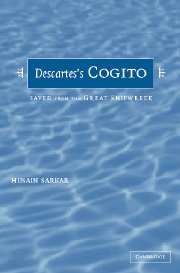Book contents
- Frontmatter
- Contents
- Preface
- Acknowledgments
- Abbreviations
- Descartes' Cogito
- 1 The Prolegomena to Any Future Epistemology
- 2 The Problem of Epistemology
- 3 The Solution: Cogito
- 4 A Skeptic against Reason
- 5 The Five Ways
- 6 Cogito: Not an Argument
- 7 The Content of the Cogito
- 8 Memory, Explanation, and Will
- Appendix A Comments on Jeffrey Tlumak's “Certainty and Cartesian Method”
- Appendix B Comments on Robert Nozick's “Fiction”
- Appendix C Cogito and the Port-Royal Logic
- Appendix D Bacon and Descartes
- Appendix E Comments on Anthony Kenny's “Descartes on the Will”
- Bibliography
- Name Index
- Subject Index
Appendix B - Comments on Robert Nozick's “Fiction”
Published online by Cambridge University Press: 01 September 2009
- Frontmatter
- Contents
- Preface
- Acknowledgments
- Abbreviations
- Descartes' Cogito
- 1 The Prolegomena to Any Future Epistemology
- 2 The Problem of Epistemology
- 3 The Solution: Cogito
- 4 A Skeptic against Reason
- 5 The Five Ways
- 6 Cogito: Not an Argument
- 7 The Content of the Cogito
- 8 Memory, Explanation, and Will
- Appendix A Comments on Jeffrey Tlumak's “Certainty and Cartesian Method”
- Appendix B Comments on Robert Nozick's “Fiction”
- Appendix C Cogito and the Port-Royal Logic
- Appendix D Bacon and Descartes
- Appendix E Comments on Anthony Kenny's “Descartes on the Will”
- Bibliography
- Name Index
- Subject Index
Summary
In “Fiction,” Robert Nozick suggests the possibility that he, Nozick, is a fictional character and so is everyone else, except for the one who is the author of the piece. My aim here is not to argue with “Fiction” as a whole, but only with aspects of it that are central to Descartes. Nozick says:
“What!” you say, “we don't really undergo suffering? Why it's as real to us as Oedipus' is to him.” Precisely as real. “But can't you prove that you really exist?” If Shakespeare had Hamlet say “I think therefore I am,” would that prove to us that Hamlet exists? Should it prove that to Hamlet? And if so what is such a proof worth? Could not any proof be written into a work of fiction and be presented by one of the characters, perhaps one named “Descartes”? (Such a character should worry less that he's dreaming, more that he's dreamed.)
(N, 462)Nozick starts with the assumption that Hamlet is a fictional character. Then, of course, no matter what speech Shakespeare puts into Hamlet's mouth, including any proof of Hamlet's existence, it is not going to prove that Hamlet exists. Ex hypothesi, it could not prove to Hamlet that he exists. By analogy, then – so Nozick seems to suggest – if we, like Hamlet, are fictional, no proof of our existence that we can mouth will confirm us in our existence.
- Type
- Chapter
- Information
- Descartes' CogitoSaved from the Great Shipwreck, pp. 273 - 277Publisher: Cambridge University PressPrint publication year: 2003



